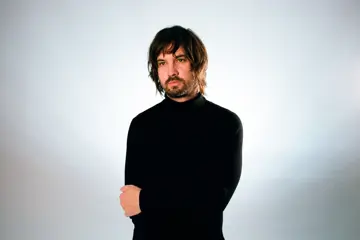 RVG
RVGFrom AC/DC’s biting rock’n’roll to Kylie Minogue’s glittery pop – all the way to Vance Joy's sunny folk and Flume’s technicolour EDM – it’s undoubtable that even the biggest of Australia’s musical exports are resoundingly diverse and creatively daring. Journey deep into the sonic labyrinth and you’ll find a seemingly endless chasm of subgenres and sub-subgenres to explore, each galvanised by its own cluster of microcosmic communities.
Many of these have strong ties to specific locations: Western Sydney has drill and hardcore punk on lockdown (or beatdown), while the Central Coast churns out some wickedly good surf-rock. From there, you can head west for the best in country, further north for the cream of the folk crop, or right up to the outer suburbs of Brisbane for the best in Australian skate-punk. Emo and pop-punk are two of those genres where city-based popularity ebbs and flows, but right now, all the best acts in both seem to be coming out of Adelaide.
Indie-rock is less nomadic – from the days of Beargarden, Blueline Medic and The Lucksmiths to the rise of Poison City powerhouses like Camp Cope, The Nation Blue and Cable Ties in the 2010s, Melbourne’s always had a stronghold on that scrappy, DIY indie sound that just shines so brightly in overcrowded sharehouses. And for the past six years, RVG have been darlings of that scene… For better or worse.
Catching up with her in a cosy inner-city café, Romy Vager stresses that both of RVG’s first two albums – 2017’s A Quality Of Mercy and 2020’s Feral – hold a special place in her heart, and she’s immensely proud of both efforts. But going into her third album with the band, Brain Worms, the singer and guitarist wanted to break free from that “lo-fi Melbourne indie-rock” tag they’d been lumped with, frustrated by its creative limitations.
Don't miss a beat with our FREE daily newsletter
“The problem I’ve always had with those [first two] records,” she explains, “is that we’d mixed them and thought about them [during the writing and recording processes] in a very specific way – so when I’d hear a song from one of them being played on the radio, I’d hear the song before it and the song after it, and I’d think, ‘Those were so much louder than our song!’ And that was just us as a band and our kind of stylised ‘Melbourne music scene’ thing – but our songs sounded so small in comparison to all the others.”
This yearning to sound full and rich has always been at RVG’s core, with Vager forming the band to explore song ideas too ambitious and grandiose for a solo project. “We had big aspirations for [A Quality Of Mercy],” she says, “but that definitely felt like a lo-fi record because we did it all ourselves, we tracked it all live at the Tote, and we spent like $100 on the whole thing – but there was always the mentality that we were writing a ‘bigger’ record. And we got closer with Feral, but that was sort of feeding off more of what we do live. So we’d always had the idea to do a really big and bombastic record like this, but we’d never actually had the resources to do it up until this point.”
To make their dreams a reality, Vager and her bandmates relocated to London, where they spent three weeks hashing Brain Worms out with producer extraordinaire James Trevascus. Vager raves about the experience, gushing that Trevascus’ “amazing” work “really helped us make the album we were trying to”. The band chose to link up with him after hearing solid reviews from “a few people we trust” – it was an expensive risk, Vager notes, but one they were all keen to take: “We figured that if worse came to worse, it was just a three-week holiday in London and we could try [the recording process] again when we got home. But it ended up being great!
“James is the kind of producer where he’s not just recording you and checking boxes, he’s coming up with his own ideas and making things sound bigger – he really invested himself in the process. Because we wanted to do a few things differently [with our sound], and James was in a position where he could make all our weird little ideas work. That was the biggest thing for us: we could come up with a new kind of riff or put a synth on something, and we’d be like, ‘Nah, this takes away our vibe’ – but James would find a way to make it work.”
In a bid to slick the record with a youthful and protean excitement, Vager was concertedly less scrutinous with her songwriting. Songs were given the space to form in unique ways: Squid, for example, came out a casual mid-rehearsal jam session, while You’re The Reason was retrofitted from an old, pre-RVG demo that Vager unearthed shortly before the UK trip. She explains of the band’s process: “We went in with seven pretty structurally solid songs, and then three songs where we were kind of like, ‘Let’s just see what happens here.’
“We didn’t write any songs from scratch [in the studio], but I was definitely picking apart bits I’d written and adding new bits in. I wanted the album to have that sense of urgency; you know, with the last record, I’d played those songs like 100 times live before we recorded them, so it didn’t feel super exciting. But this time around, the songs were very fresh. I mean, for some of them I was literally writing the lyrics right before I would do the vocals. And I needed to do that – I needed to kind of remind myself that I can do it that way – I’m a musician, I’m creative, I’m flexible…”
Paradoxically though, the narrative slant of Brain Worms came, as Vager admits, from “a removal of music”. Most of the record was written at the height of the COVID-19 pandemic, when “not much was happening and there wasn't much of a local scene to feed off or think about”. Vager killed time by “listening to a lot of podcasts” and “reading articles about sea creatures and worms and stuff”, all in an effort to distract her from “not having anything to do musically”. But as tedious as that was in the moment, Vager says it ultimately made for a more interesting palette of themes to draw from: “That breakaway from music made me explore more unique things.”
The extra time also helped Vager refine her perspectives on topics that had long seemed too foggy to focus on. Squid is a good example here too, because although its origin was very spontaneous, Vager herself had “been trying to write that song for years”. She elaborates, albeit vaguely: “It’s just very relevant to some things that had been going on in the past. And when I was able to sit down and have some distance from them, I was able to express all the feelings I had and get them into a song.”
Released back in March as the second single from Brain Worms (following Nothing Really Changes in February), Squid is a grungy, fired-up jam about society’s inability to learn from its mistakes. “Don’t go back in time,” Vager howls on its chorus; “It’s not worth it!” She likens it to the resurgence of “indie sleaze” in modern pop-culture, quipping: “People are trying to bring 2007 back, but 2007 was not good! It was never good!”
Vager honed the song’s lyrics in London, where she noticed first-hand the UK’s rise in neoliberal sentiments. “The economy is in shambles and there's no social support,” she says, “and you have all these people being like, ‘What if we try Thatcherism again, but this time do it better?’
“It’s kind of like how people talked about the Internet in the late ‘90s and the very early 2000s, where they were like, ‘It's going to change people’s lives and everything’s going to be so much easier!’ And you know, things are better to some degree, but they’re a lot worse, too – and they’re worse in ways we hadn’t really thought about before then. We invented new kinds of terrible! And now we’ve got AI and cryptocurrency, and people are using the same arguments for that. It’s like, ‘Can you not see that doing more of the same thing and never changing is kind of bad for us?’”
By now it should be clear than RVG’s ethos in making Brain Worms was rooted in change, thematically and in practise. Even on a level as granular as her vocal style, Vager sought to evolve. “I focussed a lot more on my singing this time around,” she says. “I had no idea what I was doing on [A Quality Of Mercy], and a big problem I had with that record is that people would be like, ‘Oh, is that a man or a woman singing?’ I had that with [Feral] as well to some degree, and it was like… It really hit me. So this time around, I was much more focussed on trying to change that [perception] as much as I could.”
The process, Vager explains, involved “trying to find a register that was usable”, which could give her “some sort of middle ground between energy and style”. And as anyone that’s ever worked to train their voice will know, it’s a commendable effort – Vager’s singing on Brain Worms is bright and full of life, sharp and deeply emotive in equal measures.
Asked if she thinks the hustle paid off for herself, Vager beams: “I feel so good about my vocals on this record! I really put a lot of work into it, and I think that really shows. Because like I said, this record was all about trying not to do what I’ve done before, and trying to put myself in a position where I feel happy about everything. I don’t want to look back at this record in two years and go, ‘Oh, I wish I hadn’t done that…’”
When RVG announced Brain Worms, Vager declared in a press statement that it was the band’s definitive work: “If we could only make one more album, it would be this one.” She stands by that claim today, confident that she’s minted her best work yet. “The sound of this album is what I’ve always been looking for in this band,” she reaffirms. “It’s music you can drive to, you know? My favourite songs are the ones where they’re poppy and happy, but there’s all this weird shit going on that you only really understand when you fall right into it.
“One of my favourite songs of all time is ‘Last Kiss’ [by Wayne Cochran], and that song is nice and it’s poppy, but it’s also about a car crash… I’ve always tried to maintain that energy in everything I do.”
So if Brain Worms is the ultimate RVG album, it begs the question: where could the band possibly go from here? “I think we’ll have to really change it up after this one,” Vager ponders half-seriously. “We’re going to have to make, like, a disco album… Actually, I think we were talking about making a country record at one point. I do want to buy one of those B-bender guitars, and Reuben [Bloxham, guitarist] has talked about buying a pedal steel before.
“We’re definitely thinking about what to do next. We’re in a really exciting place now, where there really is so much room to do things differently. And I've kind of realised, with the songs we've put out on this record, that people will follow us with that. There will always be people who are disappointed that we're not doing more of a ‘lo-fi Go-Betweens’ kind of thing, but there’s definitely a majority of [our fans] who are interested in what we're interested in.”
'Brain Worms' is out now via Ivy League Records.
Fri. Jun. 2 - Melbourne, VIC @ Soundmerch - FREE
Sat. Jun. 3 - Melbourne, VIC @ Rocksteady Records - FREE
Thu. Jun. 8 - Sydney, NSW @ Phoenix Central Park - TICKETS HERE
Sat. Jun 10 - Sydney, NSW @ City Recital Hall - TICKETS HERE
Wed. Jun. 14 - Melbourne, VIC @ The Forum - TICKETS HERE
Sun. Jun. 18 - Hobart, TAS @ Dark Mofo - TICKETS HERE
Fri. Jul. 21 - Byron Bay, NSW @ Splendour In The Grass - TICKETS HERE
Sat. Aug. 5 - Brisbane, QLD @ Princess Theatre - TICKETS HERE















